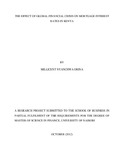| dc.description.abstract | The real estate sector is one of critical pillars in a country’s economic growth and development.
This sector makes up 5.3% of Kenya’s Gross Domestic Product (GDP) and has shown positive
growth since the year 2001 (Keeler, 2009). Mortgage industry is part of the real estate sector it
provides mortgage facilities. Mortgage financing is on the rise because commercial banks now
offer facilities of up to 100 percent, and new regulations from the Retirement Benefits Authority
allow pensioners to leverage up to 60 percent of their benefits as mortgage security (Keeler,
2009).
The objective of the study was to determine the effect of global financial crisis on mortgage
interest rate in Kenya. The population under study comprised the banking institution that offers
mortgages in Kenya, the study period was between years 2003 to year 2011. Secondary method
of data collection was used. Through an event-study approach, patterns of price changes for the
periods proceeding public announcements could yield interesting evidence about market
efficiency. The study utilized the event-study approach where the transaction date, report date,
and publication date as reported in the real estate Market were adopted.
Data was analyzed using ordinary least square (OLS) market model which measured the
estimation of abnormal return on house prices. The average abnormal returns (AARs) was
computed during event period (-4 to +4). T test was used to determine the statistical significance
of CAARt & AARt. A testable hypothesis was set. H1: The null hypothesis being tested was that
abnormal returns on & around intervention are less than or equal to zero. If the t-test statistic was
larger in absolute value than 1.96 or 2.58, the relevant abnormal return was statistically non zero
at 5% or 1% significance level respectively.
vi
From the finding the study found that Kenyan mortgage market reacted positively to global
financial crisis of year 2007s. This study showed that there were positive mean returns with
respect to global finanacil crisis , this is an indication that kenya mortage market reacted
positively to global financial crisis and lead to house price boom in kenya.
This survey has provided a framework that can be improved on, if necessary, and used to do a
similar survey or any other related studies. Such surveys can be done by leading mortgage
lending institutions, in collaboration with Kenya National Bureau of Statistics (KNBS). Leading
mortgage lending institutions should submit accurate data on to KNBS so as to enable this
exercise. This will be instrumental in providing accurate, timely and consistent market
information to the players in the market. Since this study reacted positively to the global
financial crisis of 2007. Other studies need to be done on factors that have favored Kenya against
the expected positive impact. | en |

